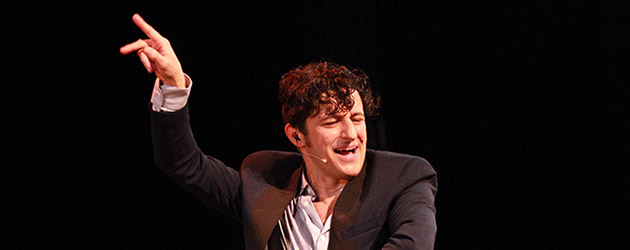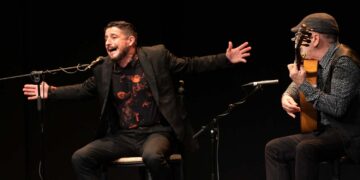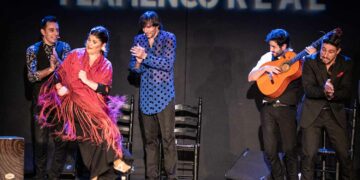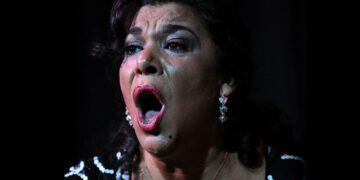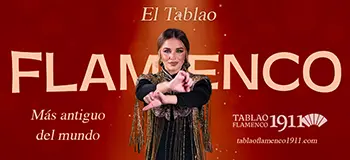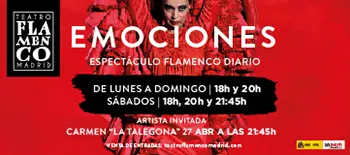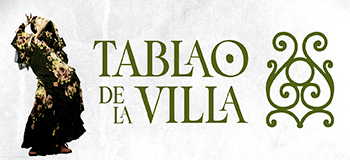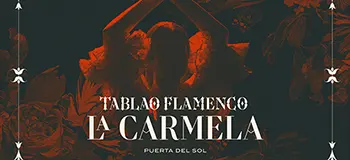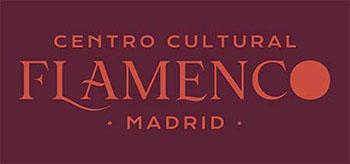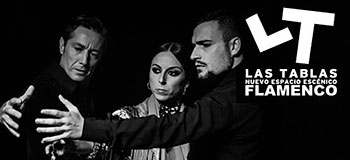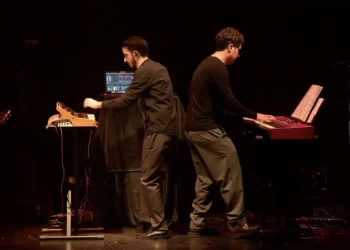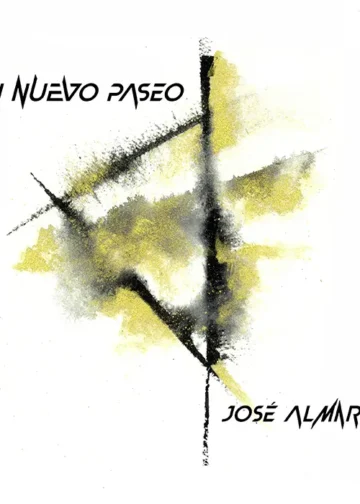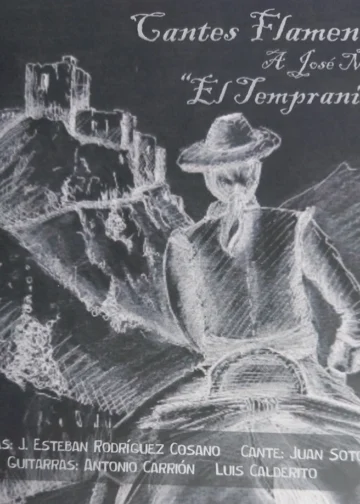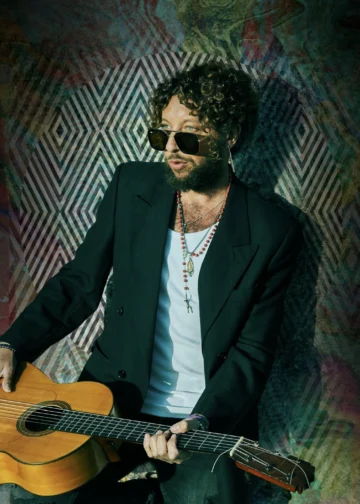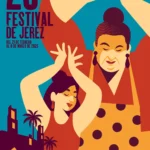Sara Arguijo
Photos: Ana Palma
On May 16th, the singer is presented his most recent record, «Denominación de Origen», in his hometown, within the framework of the 31st Festival Iberoamericano de Música Manuel de Falla, held at the Teatro Falla, and showed he feels artistically mature.
David Palomar's most recent recording «Denominación de Origen» in which he defends his identity as a Cádiz singer, and a way of being and feeling flamenco that represents the heritage of his Caleta neighborhood, always through a «personal and creative» prism. On May 16th, the work was presented in his hometown, within the program of the 31st Festival Iberoamericano de Música Manuel de Falla held at the Teatro Falla, and showed he feels he is now in full artistic maturity.
Yet even so, he says he's not in a hurry. His only goal is that he be allowed to «flow», and keep enjoying every moment of life. A life which, in his case, is inevitably impregnated with the graceful wit of his town and the true life experiences in a city «that is capable of finding lit Phoenician torches under the sea, and disguising sadness with a lighthearted bulería».
«Denominación de Origen» is therefore the label that defines the origin. David Palomar, a fresh, free, natural and sincere singer whose voice already has a label of its own.
“Cádiz is very republican when it comes to art”
-The system of «origin denomination» identifies products from a specific area. What's special about the David Palomar «brandname»?
The David Palomar brand is just a particular way of living the Cadiz identity. I adore my predecessors, and I believe it's my duty being from Cádiz to preserve the songs and forms of the area, but always with my own character, avoiding imitations or second parts that lead nowhere. To communicate that feeling to the audience, you have to live this, day in and day out…like guitarist Rafael Rodríguez says: «it's not wanting to do something, it's being able to».
-And Cádiz cante?
The cante of Cádiz is unbelievably beautiful. It's sweet, luminous, rhythmic, and at the same time profound, and it all requires difficult execution. I believe it's always been underestimated due to the idiosyncrasy by which we are surrounded, but in my opinion, the alegrías of Manolo Vargas are as pure as a soleá of Bastián Bacán, and the tanguillos of Mariana Cornejo are as profound as a siguiriya of Terremoto.
-Between one thing and another, on this recording you decisively present yourself as the heir to the Caleta style of flamenco. But your city has also been the focus of your previous records. How is this one different?
-[Laughter]. In actual fact, I take that as a compliment. Cadiz is my muse, and the source of inspiration for all my recordings, if it weren't reflected like that, I'd be lying to myself and to my audience. What there is in «Denominación de Origen» is a bigger commitment as a singer. I think we have here a more mature Palomar in every respect. My voice is more together, it's been years of work, there's more experience, and I wrote nearly all the pieces on the record; I'd been composing for some time, but I think now I can truly be called a singer/composer of flamenco.
«With this recording, I think I can now truly be called a singer/composer of flamenco»
-On this occasion you had the benefit of José Quevedo el Bolita in the production, what was it like working with him?
Everything was very easy with Bolita, he has the necessary qualities to be the perfect producer. He listens to you, he understands, he gets the best out of you, he takes you places you've never been before…he discovers new registers. His sense of rhythm is incredible, and he's a fabulous musician.
-The result is we have a fresh, direct recording…is it hard to achieve a natural quality on a flamenco recording?
So it seems…we're living in an era when new technology takes the music to an extremely high level although at times we don't realize that such a high degree of perfection takes the soul out of the music. I remember in 1997-98 when I made my first record with a group called Levantito, with analog equipment, all very artisan, with no editing or tuners…but with a lot of soul. That's why for this record I decided to record live, mixing studio work with live work.
«Cádiz flamenco singing has been under-rated due to our own idiosyncrasy»
– On the recording there's bulerías, alegrías, sevillanas, tanguillos, soleares, boleros, seguirillas… How did you go about selecting the repertoire?
Everything was natural, I'm a person who follows his intuition, signals you receive in life, from the universe or some supreme being. All the pieces have a reason for being on the record, but if I had to choose one, it would be the Nana Caletera which I dedicate to my son Jesús, and which was born the way a nana should be, singing it softly every night.
«Tanguillos of Mariana Cornejo are as pure as the seguiriyas of Terremoto»
-On your own blog you wrote that years ago you didn't like being called the successor of Chano Lobato or Beni de Cádiz, but «everything makes sense when you understand the flamenco of Cádiz is the feeling that shows you the way». What has happened that causes you to reach this conclusion?
Like I said at the beginning, I don't like comparisons, although I have to admit it's quite an honor to be compared to those great artists. My way of being is similar to theirs in a natural way, but that doesn't mean I imitate them. I'm very creative and free, and I have a very different path.
-Now that you've thought about it, how would you evaluate the Cádiz influence in your way of singing and understanding flamenco?
Well, it's in everything, in fact, I returned to my city because I needed the day-by-day feel that gives you that bittersweet flavor you need for the cantes of Cádiz, a city which is capable of finding lit Phoenician torches under the sea, and disguising sadness with a lighthearted bulería.
-You have a recital with anecdotes and memories of other artists such as Chano, El Beni and Mariana Cornejo. Does anything stand out in particular?
With Mariana, a lot of things; with Chano, a few, but I always remember one thing with Eugenio Salas «El Niño de los Rizos» and Cojo Peroche; one day they went to the cinema to see a western, and right in the middle of a shoot-out, Eugenio had to urinate and he said: «Cojo, I'm going to the toilet, be right back», and Cojo answered: «go ahead, I'll cover you». [Laughter] That was really a good one, and it's pure Cádiz.
-Now that you just returned from a tour in northern Spain, how do you sense your trademark delivery is received outside Andalusia?
Cádiz and its songs would go over even in Antarctica. [Laughter]. People understand it, they enjoy it and are grateful.
-Rosario Toledo recently commented to Deflamenco.com when interviewed about the debut of her show «ADN» in Seville, in which you also participate, the tremendous capacity of Cádiz to create and tell stories. Do you agree this is one of the main differences with this flamenco?
Cádiz has something few other places can boast of, none of the flamenco artists are like any other, we have a very republican way of seeing art, there are no preconceived patterns like in Jerez, Utrera… Revolutionary ideas were born in Cádiz which have marked the history of Spain, such as the Constitution, and the same is true of our flamenco. Wherever it's heard, no one is indifferent. It may be liked more, or maybe less, but it's always different.
«I needed the day-by-day feel that gives you that bittersweet flavor required for the cantes of Cádiz»



